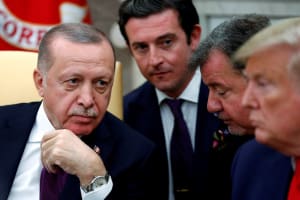Israeli deputy foreign minister seeks to strengthen ties with Fiji, other Pacific nations

Israeli Deputy Foreign Minister Sharren Haskel is on a mission to strengthen diplomatic and commercial relations between the Jewish state and Fiji and other Pacific nations.
Fiji and Micronesia have consistently backed the Jewish state at the United Nations.
In an exclusive interview with The Jerusalem Post, Haskel recalled the warmth that she encountered during her first official visit to Fiji last month.
“It was really incredible seeing all the love and the support that we are receiving from these countries, not just from the government level but also from the people-to-people level,” Haskel said.
Fiji has emerged as one of the most pro-Israel nations in the international community. In February, Fiji announced its intention to open its embassy in Jerusalem.
Israeli Foreign Minister Gideon Sa’ar praised Fiji’s diplomatic decision to join the growing number of countries that have relocated their respective embassies to the nation's capital.
“I congratulate Fiji on its decision to open an embassy in Israel, in Jerusalem, the eternal capital of the Jewish people. I thank Prime Minister and Foreign Minister Sitiveni Rabuka, a friend of Israel, for passing the decision today in the Fijian government,” Sa’ar stated at the time.
In September, Rabuka inaugurated the Pacific nation’s new embassy in Jerusalem.
Haskel hailed Fiji as one of the few countries that have consistently backed the Jewish state during the past two years of war against Iran and its terrorist proxies Hamas, Hezbollah and the Houthis.
“We’ve had an increase in some of the projects in the last year, and we’re investing in countries that we have interest in, such as the first ones who supported us, who stood beside us during those times,” Haskel said. She suggested that Fiji could potentially even contribute troops to the emerging international stabilization force in the Gaza Strip.
“We do trust the Fijian forces,” Haskel told the Rabuka. “We know that [Fiji has] very skilled military forces that are neutral, which is something especially important for peacekeeping.”
While recognizing the professionalism and experience of Fiji’s military, Haskel noted uncertainty over the Christian nation’s participation, as the Gaza stabilization force is expected to consist primarily of troops from Muslim countries.
“So they have the knowledge, they have the experience, and they’re really trustworthy. But I do know that one of the requests from the other side is that the forces that will go in to maintain the peace inside will be forces from Muslim countries,” she assessed.
Haskel said she was impressed with Fiji: “The bravery, you know, being such a small country, and sustaining so much pressure, diplomatic, economic, and still standing by [Israel].”
Jerusalem’s deputy foreign minister also recalled her visit to Papua New Guinea, which has received agricultural tech assistance from Israel.
“I saw what a huge impact the farm had on Papua New Guinea. From a place where Papua New Guinea was importing all of its fruits and vegetables, it has become a place where they actually now export strawberries and certain other vegetables,” she explained.
“And that happens within just 10 years with an Israeli company. The workers were also trained in Israel and came back, and are now managing it locally, with local communities as well,” Haskel continued. “This is a profitable company, and it will continue to grow. It will be a power of agriculture in the area.
Haskel said that Israel’s strong relationship with Pacific nations is rooted in shared indigenous identities and cultural ties.
“The Jewish people here in Israel – we are the indigenous people of this land. The land, the rivers, the mountains, the traditions, those are part of our identity. Jerusalem is not just a city. Every little hill is a part of our piece of history, is part of who we are, of our identity,” she explained.
“And those communities in the Pacific, the islanders, know it because every part of their island, their mountains, their rivers, is part of their identity,” she continued.
Haskel believes that Israel and the Pacific nations can relate to each other’s struggles throughout history.
“And so it is easier for us to relate to one another. We understand each other’s struggle,” she concluded.

The All Israel News Staff is a team of journalists in Israel.
You might also like to read this:

















